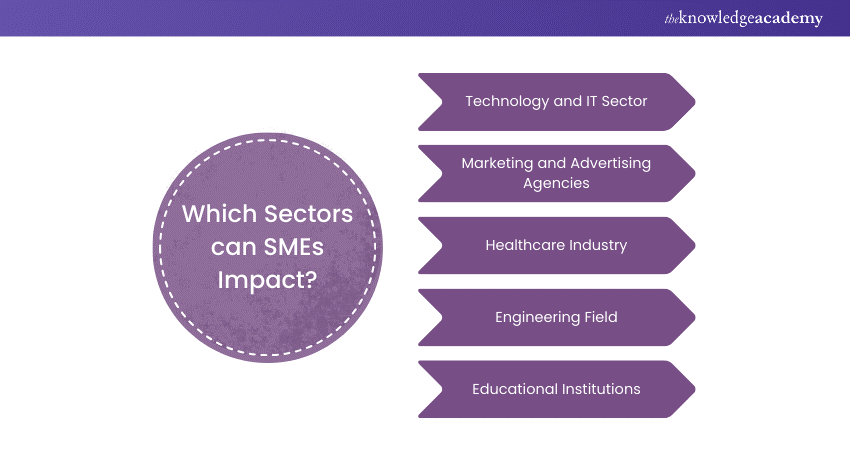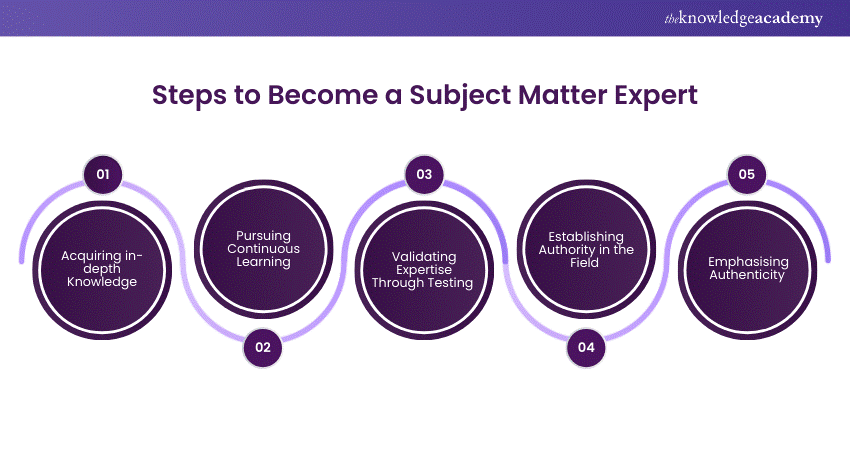We may not have the course you’re looking for. If you enquire or give us a call on 01344203999 and speak to our training experts, we may still be able to help with your training requirements.
Training Outcomes Within Your Budget!
We ensure quality, budget-alignment, and timely delivery by our expert instructors.

When we think about the literally boundless knowledge and professional level there, we discover, indeed, the place the Subject Matter Expert (SME) occupies is among the most notable. Who is a Subject Matter Expert, really? A Subject Matter Expert (SME) is an individual with deep knowledge and expertise in a particular area, field, or discipline. SMEs are highly valued for their specialised understanding and skills, which they use to guide, instruct, and inform others.
Just like a Captain can read the sea deeper, a Subject Matter Expert (SME) has unique knowledge and expertise in the field in which he specialises. They are the first-choice ones who offer a solution, advice, counselling, and information, which, in essence, makes them inexhaustible as far as problem-solving, decision-making, and information sharing within the organisation.
Table of Contents
1) What is a Subject Matter Expert?
2) What does a Subject Matter Expert do?
3) Role of SMEs in different fields
4) How to become a Subject Matter Expert?
5) Conclusions
What is a Subject Matter Expert?
Subject Matter Expert (SME) is a person who bases his/her profession upon specific field which hereby entails specialised knowledge. No one knows about these issues more than they do since, along with an excellent professional background, that person has practised in this field for many years. Such a role could come off as being a hired professional who is an expert in that area and is consulted for their specialist point of view.
SMEs take a leading role by coming up with shrewd ideas, giving useful advice and back-up in the direction-making process, and enriching the knowledge base. They assist in this role by acting as reliable sources of information that help people comprehend intricate ideas and give suggestions based on their knowledge, which, in turn, greatly strengthens this process.
What Does a Subject Matter Expert do?
An SME positions themselves and curtail their interactions to their areas of expertise by executing various tasks and performing numerous responsibilities. Here are some common activities that SMEs engage in:
1) Providing Expertise: SMEs have professional and specialised knowledge, enabling them to affect the individuals or the team who need to get information about straightforward problem-solving to informed Decision-Making.
2) Training and Mentoring: Small to medium enterprises play a pivotal role as trainers and mentors in the business community. Their knowledge transfer, whether through workshops, seminars, or one-on-one counselling, not only benefits others but also inspires continuous learning within their organisation or industry. For instance, incorporating NLP Training into their offerings can enhance their ability to provide valuable insights and expertise.
3) Consulting: SME involvement can vary from giving consultations on specific projects or initiatives for which their expertise is required. The experience allows them to convey their expertise in the form of suggestions, tips, and solutions to perennial problems.
4) Content Development: SMEs provide feedback on the content development of user training manuals, deed plans, instructional manuals, or other expertise-related materials. They help people verify data relevance and obtain grammatical correctness as well as sufficiently clear information.
5) Collaboration and Teamwork: SMEs actively collaborate with cross-functional teams, leveraging technology and sharing their knowledge to uphold project goals and resolve any challenges that may arise. This collaborative spirit fosters a sense of unity and shared success.
6) Continuous Learning and Research: SMEs always keep track of the present situation regarding business procedure, analysis, and focus. They keep expanding their knowledge, capacity, and cutting edges of their area via incessant exposure to cutting-edge disciplines.
Enhance your mentoring and leadership skills with our Mentoring Training – join today!
Role of SMEs in Different Fields
Small and Medium businesses (SMEs) are the backbone of the business economy; they play a central role in the innovation, unemployment, and global economic development issues of several fields. They are excellent with agility, imagination, and local affiliations. These factors assist them in adapting to different roles in different fields. Here’s how SMEs make a significant impact across five key sectors:

1) Technology and IT Sector
In the Technology and IT sector, small businesses are the ones that lead the way in the tech/information tech sphere. These medium-sized companies are usually the ones that push such technical developments ahead, frequently risking the new concepts that the big players are not ready to embark on.
This is a new age, where speed dictates a mode of action. Companies may modify themselves to incorporate the most recent technologies, which means offering state-of-the-art solutions and services. SMEs can write custom software and create new applications. They can also provide specific IT support services, which help build the people-centred power of technology to reach a wider audience and satisfy even more individual requirements.
Starting with competition, their contribution is prevalent in this perspective as well as pushing limits of what's possible and in turn making us have a technologic world that remains vibrant and dynamic.
2) Marketing and Advertising Agencies
Micro, Small and Medium (MSMEs) that offer marketing and advertising expertise to the companies afford a unique view on brand communication and positioning. Their size becomes an advantage just by allowing critical and imaginative thinking to take place without the limitations which usually result from too big and colourless businesses.
These marketing campaigns that resound with the target audiences are crafted by them in such a manner that they can flex their agility. On top of that, SME agencies are very responsive, having the ability to turn things around rapidly in cases where market reactions are different from initially expected or market trends constantly shift, guiding marketing efforts towards a topical manner. Leveraging techniques like Neuro-Linguistic Programming can enhance their ability to connect with and influence their audience more effectively.
3) Healthcare Industry
In the health sector, SMEs play an important role in the provision of specific services and goods, targeting markets that are well-ordered by multinationals. From creating the latest designs in modern medical technology to offering community-based health services, these organisations introduce their services at a home level because they understand the importance of caring for the patient.
Moreover, they act as the most important factor in implementing medical research and pushing for development, especially in niche areas that may not provide the broad market appeal necessary by large pharmaceutical companies but are a vital part of the treatment of certain health problems.
Build a strong base of coaching efficiently with the Coaching And Mentoring Course – sign up now!
4) Engineering Field
The engineering industry will greatly receive the impact of small and medium enterprises (SME) involvement. Such companies tend to take up projects that are relatively specialised in nature and require a high level of customisation and professional expertise – areas where the larger engineering conglomerates might not possibly be as efficient or graceful.
It is small and medium-scale enterprises in engineering that provide the major innovation dimension. Some real time examples are eco-design, renewable energy applications, thus enabling directed support against global crises such as climate change and sustainable development. Nimble ways they possess help them pioneer engineering problems through different means and by being the first to break the bounds of the traditional practices.
5) Educational Institutions
The SMEs contribute to the reformation of education by developing new teaching methods and laying down educational tools and packages. They consist mainly of e-learning programs created in order to meet the needs of specific curriculums as well as teaching methods and technologies that better fulfil the learning process.
However, not only is their role primary, but it is also valuable in ensuring that education becomes more available and inclusive. This allows different learning methods and serves various learning styles. In addition, small-scale businesses often develop collaborations with educational institutions in order to implement programs that empower the students with the skills that the current workforce demands. As a result, they become employable, bridging a gap between education and industry.
How to Become a Subject Matter Expert?
The fact that in order to become a Subject Matter Expert (SME), one should be ready to study, and learn one particular domain or subject. They should not only be limited to just grasping the fundamentals. Here are the steps to become a Subject Matter Expert:

1) Acquiring In-depth Knowledge
Your first action as an SME, known as a Subject Matter Expert, is to have a deep knowledge of the field or topic that you specialise in. In addition, this goes far beyond the apparent level of the problem; you are forced to submerge into the core complexities that many others might ignore.
Get into every single resource around - media, research papers, training materials, and others. Seek every chance to employ practical methods. As experience is a bird that never flies back, undoubtedly, the entire contribution of theoretical study cannot be fully obtained. Most of the time, the focus is on extensive knowledge that lays the right ground for professionalism.
Acquire all necessary knowledge about designing and preparing for a training session with our Train The Trainer Course – join today!
2) Pursuing Continuous Learning
As in any field, the landscape is subject to change with the advancing times, resulting in novel findings, new technologies and innovative methodologies. For you to be a small and medium enterprise (SME), you must be a thirsty sponge in the ocean of knowledge. You must not cease acquiring knowledge. It, therefore, includes being well-informed on what's new, the latest research findings, and the best practices in your field, among other things.
Visit seminars, attend workshops, and participate in conferences. Get in the magazines, blogs and podcasts. Those should closely follow you or the topic. The purpose is for you to be able to keep your education topical and complete so that whichever solutions you give will be the most recent and appropriate.
3) Validating Expertise Through Testing
Earning the knowledge is no doubt paramount, but making the distinction between it and expertise is key, using certifications, degrees or similar kinds of testing to leverage the proof. Such certifications become the actual proof for employers and other people of your mastery and knowledge: What is more, they give a signal to potential employers and customers that they can entrust you with their projects or issues.
Find reputable certificates that are specific to your field or consider pursuing advanced studies such as attending graduate schools. Create your Own Post! Taking part in competitions, researching and writing papers for after school, university, or industry have all mentioned earlier as mechanisms of validation.
4) Establishing Authority in the Field
"To be in the club" of SMEs, you must demonstrate knowledge in the niche. Aside from that, you talk and write with words that mean something to the crowd. The best sources of advertising are a blog, YouTube channel, or publishing articles that generate traffic to your website.
Participate in online discussion boards, social media groups, and other online platforms, which are tailored specifically for people in your line of work. Holding seminars and giving speeches is another way for you to gain a bigger audience and attract their attention. This can be attained by offering your knowledge, which not only assists others but also contributes to you being a go-to authority in your field of expertise.
5) Emphasising Authenticity
Last of all, authenticity matters most to your becoming an SME. Be sure to have real enthusiasm, which is the major factor behind your expertise-building effort. Authenticity also supposes that you be aware of the constraints that may be limiting your knowledge and perceive opportunities for others to contribute to your work.
It primarily means giving a very honest picture in your own words and experiences by laying down without the use of pretence, exaggeration or any other non-verbatim expedient. Real startups build trust and respect, which are critical for success in SMEs and are the only way to determine who owns a startup.
Conclusion
Putting it all together, Subject Matter Experts act as an illuminating light of expertise and specialisation in their chosen sphere, offering extreme insights and recommendations for both individuals and firms that take them to new heights of success. That is what the SMEs do best because they know and are constantly learning in their industry, and so they improve communication, which is a source of solutions to complicated challenges.
Build a strong base of coaching efficiently with Coaching And Mentoring Course – sign up now!
Frequently Asked Questions

Yes, being a Subject Matter Expert (SME) can be a highly rewarding job. It allows for deep specialisation in a particular area, offers opportunities for leadership and influence within an organisation, and often leads to higher job satisfaction through expertise recognition and the ability to make impactful contributions.

Hiring a Subject Matter Expert (SME) provides access to specialised knowledge and expertise, ensuring high-quality, informed decision-making. SMEs bring depth of experience, innovative solutions to complex problems, and enhance the credibility and effectiveness of projects and teams.

The Knowledge Academy takes global learning to new heights, offering over 30,000 online courses across 490+ locations in 220 countries. This expansive reach ensures accessibility and convenience for learners worldwide.
Alongside our diverse Online Course Catalogue, encompassing 17 major categories, we go the extra mile by providing a plethora of free educational Online Resources like News updates, Blogs, videos, webinars, and interview questions. Tailoring learning experiences further, professionals can maximise value with customisable Course Bundles of TKA.

The Knowledge Academy’s Knowledge Pass, a prepaid voucher, adds another layer of flexibility, allowing course bookings over a 12-month period. Join us on a journey where education knows no bounds.

The Knowledge Academy offers various Business Skills Courses, including Personal Developemnt, Training the Trainer Course, Communication Skills Course, Leadership Management Courses, and CeMAP Courses. These courses cater to different skill levels, providing comprehensive insights into Top 15+ Corporate Trainer Interview Questions and Answers
Our Business Skills Blogs cover a range of topics related to leadership approach, offering valuable resources, best practices, and industry insights. Whether you are a beginner or looking to advance your leadership skills, The Knowledge Academy's diverse courses and informative blogs have you covered.
Upcoming Business Skills Resources Batches & Dates
Date
 Leadership Skills Training
Leadership Skills Training
Fri 28th Feb 2025
Fri 11th Apr 2025
Fri 27th Jun 2025
Fri 22nd Aug 2025
Fri 24th Oct 2025
Fri 12th Dec 2025







 Top Rated Course
Top Rated Course



 If you wish to make any changes to your course, please
If you wish to make any changes to your course, please


